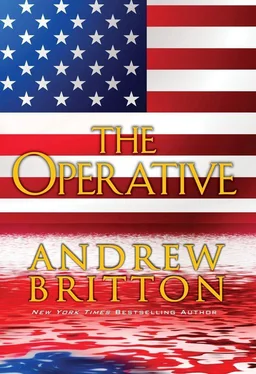Andrew Britton - The Operative
Здесь есть возможность читать онлайн «Andrew Britton - The Operative» весь текст электронной книги совершенно бесплатно (целиком полную версию без сокращений). В некоторых случаях можно слушать аудио, скачать через торрент в формате fb2 и присутствует краткое содержание. Жанр: Триллер, на английском языке. Описание произведения, (предисловие) а так же отзывы посетителей доступны на портале библиотеки ЛибКат.
- Название:The Operative
- Автор:
- Жанр:
- Год:неизвестен
- ISBN:нет данных
- Рейтинг книги:5 / 5. Голосов: 1
-
Избранное:Добавить в избранное
- Отзывы:
-
Ваша оценка:
- 100
- 1
- 2
- 3
- 4
- 5
The Operative: краткое содержание, описание и аннотация
Предлагаем к чтению аннотацию, описание, краткое содержание или предисловие (зависит от того, что написал сам автор книги «The Operative»). Если вы не нашли необходимую информацию о книге — напишите в комментариях, мы постараемся отыскать её.
The Operative — читать онлайн бесплатно полную книгу (весь текст) целиком
Ниже представлен текст книги, разбитый по страницам. Система сохранения места последней прочитанной страницы, позволяет с удобством читать онлайн бесплатно книгу «The Operative», без необходимости каждый раз заново искать на чём Вы остановились. Поставьте закладку, и сможете в любой момент перейти на страницу, на которой закончили чтение.
Интервал:
Закладка:
Trask phoned Brigadier General Arthur Gilbert, the commanding general at the White Sands Missile Range. This was a direct call to his secure cell phone, one that was not used unless there was an emergency.
General Gilbert answered at once. He did not know about Trask’s personal project; it had not been necessary to involve him, nor was it remotely possible that he would have participated. Still, the brigadier general would be useful.
“Jacob, what have we got?”
“Pony Express.”
“Aw, Christ.” The code name indicated that nuclear materials had been passed from one vehicle to another. “Where was the handoff?”
“We’re trying to find out.”
“The crates’ GPS locators?”
“Presumably disabled by Shotgun while the driver was checking in.” That was the assignation for whatever man was in the passenger’s seat. Trask checked the latest data. “The source is en route to you, on Interstate Thirty just outside of Texarkana. The Texas Highway Patrol has been notified, but we need him to not be taken. This is not a due process situation.”
“No, sir, it is not,” the general agreed. “I’m drafting an order for the garrison commander to execute a SAD ASAP. We will have birds in the air in a quarter hour.”
A seize and detain order was a benefit of the Patriot Act. It allowed the military to capture a suspected enemy combatant without a warrant or anything in hand other than circumstantial evidence that suggested “cause or motivation.” It was legalese that allowed the government to act with the same powers and impunity as the secret police in any nation on earth.
Knowing that General Gilbert was on the case made Trask feel better. He would take the men into custody, hold them incommunicado until one million dollars was found in each of their bank accounts, money they were paid to turn over the two nuclear weapons.
It was 10:00 a.m.
All they needed was another eight hours. Not only had Trask seen the DoD white paper, but he had helped to write it as a distinguished civilian advisor. When the next act had concluded, there would be no question what the nation-and the world-should do.
As soon as he hung up with White Sands, Trask went to the FBI Web site and typed in Hunt’s data to gain access to the domestic tracking requests. Finding the information he needed, he picked up the phone. There was something else he needed to make happen.
CHAPTER 24
NEW YORK, NEW YORK
Hunt had no interest in what his colleagues from the New York field office were saying. He knew what had happened here; he’d helped to plan it. He knew what they would do in response, and it was unfolding around him. The FBI was the perfect reaction machine. Something happened, they checked the playbook, and they deployed.
That kind of thinking was what had brought Hunt to this point. He had grown up in a family of cops. He remembered his grandfather’s frustration when Miranda suddenly became more than just the surname of a Brazilian samba singer. Suspects, even those caught in the act, suddenly had more than just their constitutional rights. Those rights had to be spelled out while the perps spit and swore at you. Hunt’s father was young enough to adjust-and was pushed backward into oncoming traffic on Philadelphia’s Broad Street by a mugger whose rights he was reciting. The elder Hunt never walked again.
Hunt had grown up believing in preventative action, which was why he’d joined the Bureau. He thought he would have the opportunity to infiltrate criminal organizations, sniff out terrorists in their communities, track clearly unrehabilitated felons as they returned to their previous lives. Hunt wanted to do it all with the fidelity, bravery, and integrity that was the FBI motto. He also had his own subset of that, his own personal marching orders: foresight, boldness, and imagination. His father and grandfather often spoke of the sixth sense a lawman had or acquired for knowing who was square and who was not. Hunt possessed that instinct. It didn’t matter to him who had to be put down to protect “the good.” It had never mattered to him.
Even in the more trivial times of his youth, he’d learned that winning was just the beginning of success. Young Alex had been playing king of the hill in the backyard when his neighbor’s Doberman, Sergeant Pepper, was let out, and spurred on by the rowdiness of the kids, it impulsively jumped the fence and went on the attack. Terrified, the other boys scattered toward the house, but it was Alexander, the king, who stayed and faced the canine head-on. His mind quickly chose a different battlefield.
Hunt ran down the hill, across the street, and channeled the pursuing dog into the small cemetery on the adjacent block, where he industriously picked up a collapsed tombstone and used it brazenly to crush the dog’s back before it could fully latch on to his leg.
Sergeant didn’t die instantly, but instead wriggled and whimpered on the manicured lawn while Alexander’s friends slowly congregated and then celebrated their safety with applause and taunts to the now debilitated, squirming creature. Hunt challenged any one of them to finish the job, to match the strike he had been forced to make. And no one stepped forward. Having sustained only a scratched ankle and calf from the initial chase, Hunt took a deep breath and brought his foot down heavily on the creature’s chest, crushing the remaining life out of it. Checkmate. He then methodically dug a hole with his hands and buried the remains under a nearby willow tree, the other boys uselessly stomping the earth down afterward, and then Alex went home without saying another word. His friends kept quiet about the missing dog. The deed was done and couldn’t be undone, no matter what sentence was passed-nor did they wish to answer to Hunt if they spoke up. His equanimity had protected not only him, but them. And to them, the small fee of silence was worth the price of security. And Alex’s reward of preserved loyalty, however useless his cohorts were at the time, taught him to start choosing his associates more carefully. Friends with better hits.
It seemed to Hunt that humankind had become apprehensive and could no longer keep pace with an exceptional willingness to prevail. To stand one’s ground. To fight inflexibly for sovereignty. And sacrifices just became footnotes to his many Bureau successes, casualties of his inviolable crusade for better traction. For the greatest advantage.
Because of the rules, because the Federal Bureau of Investigation was so concerned with rights and with not offending this group or that by profiling, by eschewing critical eyes on the borders, on mosques, on ethnic neighborhoods, or on markedly nonethnic neighborhoods where white supremacists were known to dwell, the FBI had lost the all-important first-strike capacity.
And so the United States of America became the giant who had to take the jabs while waiting for the opportunity to kayo an opponent. That was true at home, and it was true abroad, where most of the hate was nurtured. Trask had said it best in their first meeting.
“No more surgical strikes, no more military body bags,” he’d said. “We’ll turn the desert to glass and clean up with Windex.”
Getting to that point would come with an awful price. But it was necessary. And before Hunt’s father died, the AD wanted to be able to go to his bedside and say, “Dad, we went on offense, big-time.” He wanted to see the old man smile before he died.
Hunt had walked over to the agents to stall his guests. But he was watching them, and when he saw Bishop peel off, he had a good idea where he was going. Hunt was about to excuse himself when his Minotaur beeped. He stepped from the others, watching Bishop, while he took the call.
“Where is Muloni?” the caller asked.
Читать дальшеИнтервал:
Закладка:
Похожие книги на «The Operative»
Представляем Вашему вниманию похожие книги на «The Operative» списком для выбора. Мы отобрали схожую по названию и смыслу литературу в надежде предоставить читателям больше вариантов отыскать новые, интересные, ещё непрочитанные произведения.
Обсуждение, отзывы о книге «The Operative» и просто собственные мнения читателей. Оставьте ваши комментарии, напишите, что Вы думаете о произведении, его смысле или главных героях. Укажите что конкретно понравилось, а что нет, и почему Вы так считаете.












